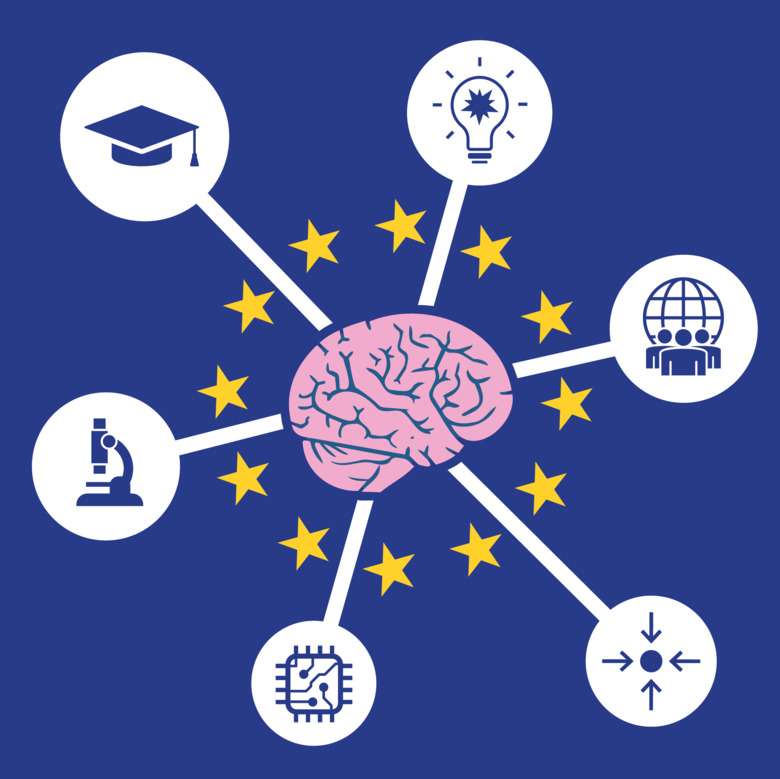The University of Brain and Technology – NeurotechEU is celebrating 1 year
A digital 1-day meeting attended by 300 participants brought neuroscience researchers from across Europe together to reflect on both progress to date and plans for the future for the collaborative European University Initiative (EUI) focusing on neurochallenges. Karolinska Institutet is one of eight original parnters.

As host of the first annual summit for the University of Brain and Technology – NeurotechEU – Karolinska Institutet’s vice-rector for doctoral education and NeurotechEU Board of Governors member, Professor Bob Harris opened the meeting.
- Considering the wonderful innovative advances in treatment of many diseases which historically were untreatable, neurological diseases represent the ‘last research frontier’ in which little or no progress has been made. NeurotechEU is the only EUI focusing on this theme and thus creating a wonderful niche for us, said Bob Harris.
The European University of Brain and Technology - NeurotechEU is an alliance between eight (soon to be ten) European universities with the goal to build a trans-European network of excellence in brain research and technologies to increase the competitiveness of European education, research, economy and society.
Two new partners
One very important development is the recent expansion of the NeurotechEU alliance. Two new members were welcomed, the Reykjavik University and Georgia Tech Lorraine. Dr. Ragnhildur Helgadóttir, Dean of School of Social Sciences from Reykjavik University commented on the ongoing crossdisciplinarity neuroscience research at her university. Main coordinator of NeurotechEUTansu Celikel, presented Georgia Tech Lorraine and how this university, with a network of three sites in Atlanta in the USA, Metz in France and Shenzhen in China offers great opportunities for future global expansion of the NeurotechEU ecosystem.
3-minute thesis competition finalists
PhD students from within NeurotechEU had competed in a 3-minute student thesis competition, and the 15 finalists performed live to the captive summit audience, who voted for winners reflecting four presentation skills: presentation style, visual design, creativity and innovation. One winner was selected in each category. Congratulations to all finalists and especially to the 4 winners!
- Adriana Ge Gonzalez (University Miguel Hernandez, Spain) – Best Presentation
- Lynn Le (Radboud University, Netherlands) – Best Visualization
- Cristiana Tisca (Oxford University, UK) – Most Creative Presentation
- Guoming (Tony) Man (University of Bonn, Germany) – Most Innovative Presentation
The breadth of research within the alliance
The main focus for the afternoon was on research within the alliance, and especially of the link from innovation to societal changes that is an integral part of the NeurotechEU vision.
Mohsen Kaboli from Donders Institute and BMW described the process of taking an invention to an innovation. He showed how inspiration from studies of animals can be used to develop robots and taking the perception of driving to the next level using tactile senses.
Staffan Holmin from Karolinska Institutet presented intriguing research using endovascular techniques that have revolutionized this field of medicine. One of the inventions within the Holmin group is the ExtroducerTM, a medical device developed in collaboration with KTH that enables delivery of substances and cells into tissues accessible through the circulation, as well as a novel principle for obtaining biopsies.
-This development reflects all the ambitions of NeurotechEU, as it is a multidisciplinary, collaborative and innovative research project that included a PhD and has resulted in commercialization and has great potential for societal impact, said Bob Harris.
Finally, the first NeurotechEU summit keynote speaker was Peter Hagoort (Max Planck Institute for Psycholinguistics, Donders Institute, Netherlands) who linked language research with neuroscience and artificial intelligence in the title of his lecture ‘The Brain’s Infrastructure for Human Uniqueness.’ He concluded that Human-machine interactions will become more successful if the complexity of languages and humans’ minds interpreting language, intentions and situations are taken into consideration.
Tansu Celikel concluded by outlining some of the challenges ahead for NeurotechEU and the next steps for the alliance. Bob Harris wrapped up the summit, thanking all participants and presenters and stressing the importance of neuroscience for future generations and referring to the increasing numbers of people of all ages struggling with mental health.
